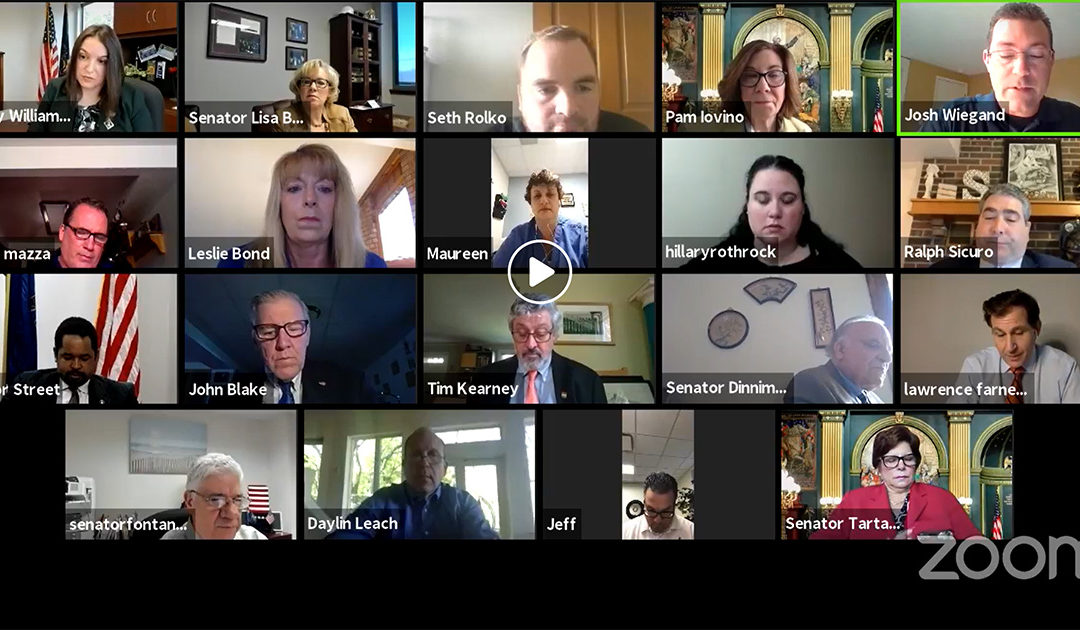Pittsburgh, PA − April 28, 2020 − Senator Lisa Boscola convened a policy hearing today, co-chaired by Senator Lindsey M. Williams and Senator Pam Iovino, focused on front-line essential workers during the COVID-19 crisis. This hearing coincided with Workers Memorial Day, which is the annual day of remembrance for workers killed or injured on the job and a day for renewing the fight for strong safety and health protections for all workers.
“All work has value and all workers should be valued,” said Senator Williams. “One way we can show that value is by protecting the lives of those workers. Many of our current front-line essential workers didn’t sign up for life-threatening work. They have received very little training in how to protect themselves and others from the spread of coronavirus. But because of a lack of training, supplies, and access to PPE, our bus drivers and mechanics, grocery store employees, home health care workers, cleaners, and other essential workers are being infected and dying from COVID-19. We have to do better. All work is interconnected and we depend on each other. These essential workers are the backbone of our economy and we must give all of them access to adequate PPE and testing, paid sick leave, and protections for reporting healthy and safety issues at their workplace.”
“Workers across our commonwealth are placing themselves in harm’s way to protect and serve the public during this crisis. They deserve to be safe,” said Senator Iovino. “Today we heard clearly from workers across the spectrum of life-sustaining industries what their real world looks like right now: inadequate PPE, testing, paid sick leave, and child care. We in the General Assembly must continue to focus on correcting these deficiencies as we discuss how Pennsylvania can safely begin to re-open our economy in a phased and data-driven way. This is the only way to do right by the essential personnel who are helping us weather this storm.”
Two panels of workers and representatives presented testimony about their experiences on the front lines of the COVID-19 pandemic and answered questions from sixteen members of the Senate Democratic Caucus. The first panel included testimony from medical professionals and first responders. The second panel included testimony from non-medical front-line essential workers. This was the first Senate Democratic Policy Committee hearing to be held entirely virtually.
“The scariest part of this is, because of lack of widespread testing, our workers could have the virus without symptoms,” said Hillary Rothrock, a home healthcare worker in Harrisburg who cares for her brother. “This means there’s a reasonably good chance that we wouldn’t be able to know which of us introduces the virus that will kill my brother, or me, before it’s too late. We need priority testing for healthcare workers, widespread testing for the general population, and contact tracing. We also need PPE, and we need it now. We need essential pay for our essential work – now and in the future.”
“We as the deliverers of healthcare must also be at the table in any discussions, planning, or legislation on how we move forward. If realtors get a say in our recovery plan, surely caregivers should as well,” said Maureen Casey, a Registered Nurse at Hershey Medical Center. “It is time — literally a matter of life and death — to build a better healthcare system that values the essential workers and those for whom we care.”
“As first responders, we understand our profession comes with risk and we will continue to perform our duties knowing that risk we take,” said Ralph Sicuro, President of Pittsburgh Fire Fighters IAFF Local No.1. “But this virus has raised the level of risk because when we are exposed, we’re taking that exposure home to our families. This has increased the stress and anxiety levels for first responders and our families.”
“Among our members there are 5 confirmed COVID-19 deaths and hundreds of positive tests,” said Leslie Bond, Political and Legislative Representative of United Food and Commercial Workers Union, which represents grocery store employees. “Staffing levels were inadequate to accommodate the avalanche of panic buyers as well as families trying to stock up in preparation to be homebound for weeks. Truthfully, grocery store workers without PPE came into contact with more potentially infected human beings than probably any other work group, especially during the first few weeks. Many shoppers were frightened and angry and took out their hostility on workers who were also frightened.”
“We would love nothing more than to reopen the economy. Working class and communities of color have been disproportionately affected by this shutdown,” said Gabe Morgan, Vice President of 32BJ SEIU. “But the idea of opening the economy when healthcare workers, bus drivers, and the people maintaining and keeping the workplace safe don’t have what they need to go to work and be safe? How can we expect people not to contract the disease? The people who do the work that will make everyone else safe aren’t safe right now. They can’t protect you if you open up the economy right now.”
The full list of panelists included:
Josh Weigand, Volunteer Fire Chief & EMS Provider, West Deer Volunteer Fire Company #3;
Ralph Sicuro, President, Pittsburgh Fire Fighters, IAFF Local No. 1;
Maureen Casey, Registered Nurse, Hershey Medical Center;
Hillary Rothrock, Home Healthcare Worker;
Ted Lee, President, Branch 84, Letter Carriers;
Jeff DiPerna, Business Agent/Maintenance, Amalgamated Transit Union Local 85;
Steve Mazza, Council Representative, Greater PA Council of Carpenters;
Leslie Bond, Political and Legislative Representative of United Food and Commercial Workers Union;
Gabe Morgan, Vice President, 32 BJ SEIU
###

